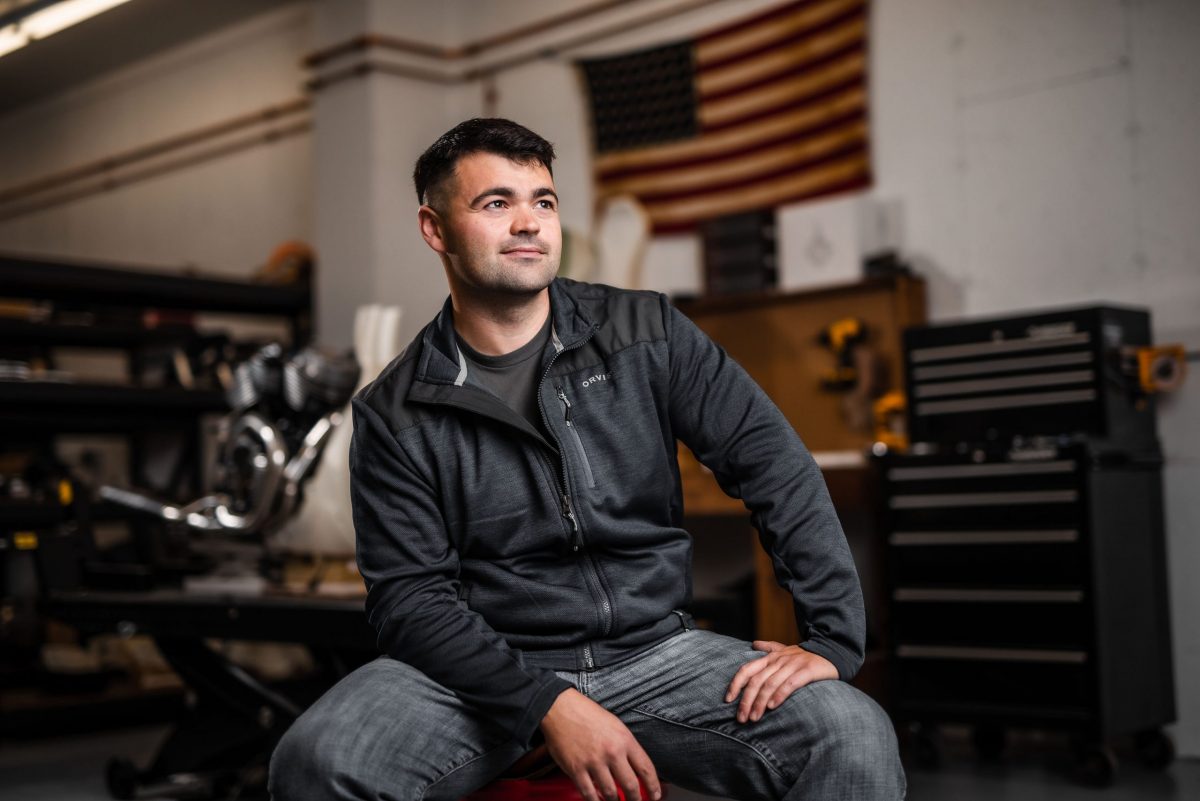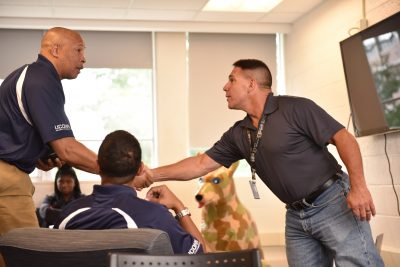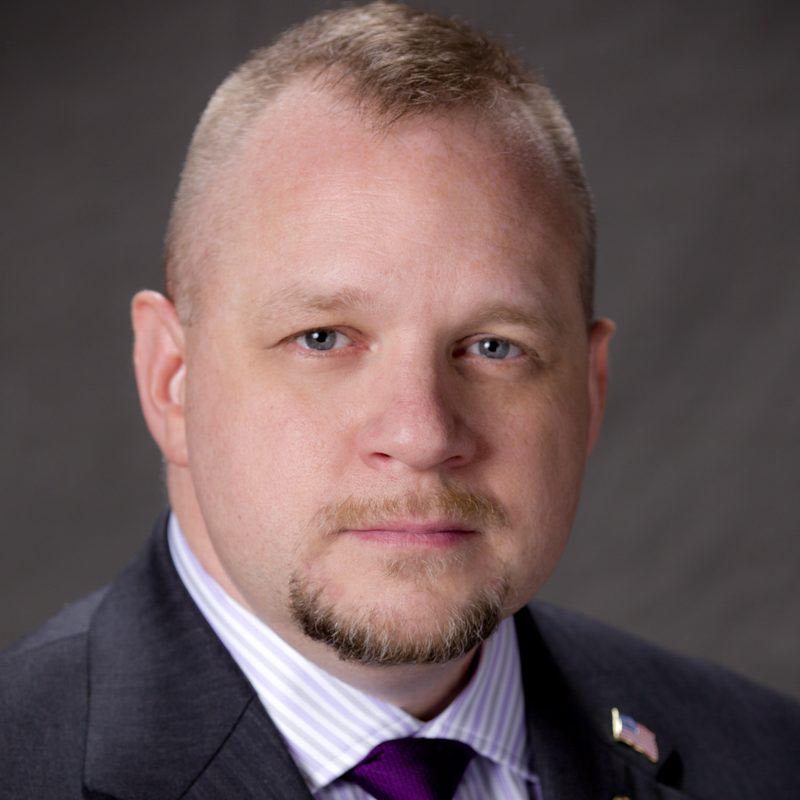
The Entrepreneurship Bootcamp for Veterans (EBV) program offers cutting edge, experiential training in entrepreneurship and small business management to post-9/11 veterans.
Since 2010, the UConn School of Business has been proud to participate in this very special program that helps give back to individuals who have sacrificed for our country. EBV demonstrates the power of entrepreneurship in our communities by fostering an essential route for job creation and economic vitality.
The EBV is designed to give focused, practical training in the tools and skills of new venture creation and growth and the establishment of a support structure for graduates of the program.
EBV also serves a critical function in helping our disabled veterans work through their physical limitations, psychological challenges, and social obstacles. EBV brings together a dedicated UConn community of faculty, staff, students, alumni, and others to rally around this group of exceptional individuals.
The program has graduated 253 veterans and military spouses. Our mission in the next 10 years is to help transition those retiring from long-term military posts into civilian careers that may sustain them and their families. UConn remains committed to making the university a national leader for veteran entrepreneurship.
PROGRAM FORMAT

PHASE I
A 30-day online curriculum exposing participants to business fundamentals and research.

PHASE II
A nine-day residency including workshops and courses taught by UConn faculty along with guest lectures from successful entrepreneurs and business executives.
*Next residency: August 2024

PHASE III
The EBV National Program is managed by Syracuse University’s D’Aniello Institute for Veterans and Military Families (IVMF). The IVMF Post Program Support Services provides technical assistance upon completion of the residency. This assistance includes a comprehensive network of mentors, resources and national partners.

"As an entrepreneur, I wasn't afraid to jump into the woods, because I knew where I wanted to go and what I wanted to accomplish. But, I wasn't quite sure how to navigate all of the paths that I came across. EBV gave me the compass; and now I am on the direct path to success.''
William J. Stacey
Founder, Freedom Corp
EBV 2023 Cohort Member

“The EBV program really was life changing. I came into it knowing just enough about starting a business to be dangerous. The EBV program helped me to connect the pieces of what I’d learned. The average person who has a great business idea doesn’t think about the cash-flow analysis and attracting the right stream of customers through a targeted marketing plan. I felt like I earned a mini MBA.”
Jason Otrin
Founder, On Course Drones
EBV 2017 Cohort Member
MAKE A GIFT TO EBV
The EBV program is offered entirely free to participants through the generous support of EBV universities, and the private giving of individuals and corporations. Expenses covered by the program include: transportation, lodging, food, and textbooks.
In addition, the program does not require use of GI Bill or VOC-Rehab benefits.

THE EBV NATIONAL PROGRAM
The EBV opens the door to economic opportunity for veterans by developing their competencies in the many steps and activities associated with creating and sustaining an entrepreneurial venture. Founded at Syracuse University in 2007, the program has since expanded to additional universities across the United States, including: Texas A&M, UCLA, the University of Connecticut, Louisiana State University, Florida State University, Saint Joseph’s University, Wright State University, and the University of Missouri – with Syracuse University serving as national host of the consortium of schools.
MEET THE UCONN EBV TEAM

Nicholas Martinelli
Program Manager
nicholas.martinelli@uconn.edu

Mehgan Williams
Program Coordinator
mehgan.williams@uconn.edu
Michael J. Zacchea
EBV UConn Founder & Director
1968 - 2022
We are forever grateful for Michael's vision, passion, camaraderie and leadership of the EBV program. This life-changing program will live on in his honor.

EBV Alumni
Sonia E. Addison
Barjohn R. Amos
Chad C. Bartow
Lee Browning
Ryan Cohen
Michael Donnell
Nathaniel LaZard Sr.
Raelin M. McCune
Ronald J. McCune
Pedro Melendez Matos
Arron Momon
Roland N. Muniz Jr.
Shaun L. Redden
Danielle Rezendes
William J. Stacey
Keri-lynn Yonika
- Martin Battcock
- Stacey Brown
- Sheila Buswell
- Monifa Caines
- LaToya K. Edwards
- Keith Hasan-Towery
- Mimi Martell
- Paul E. Murphy
- Matthew L. Raiford
- Tia L. Raiford
- Stevenson Reed
- Bernard L. Snow Sr.
- Amanda Stanley
- Ingrid Weissenfluh
- Scott Yaglowski
Mark A. Brown
Robert Burton
Yolanda Y. Creal
Damian Dobbs
Elisa Glass
Cynthia G. Hawkins
Lloyd Howard Jr.
Thomas Aaron Johnson
Jennifer Killip
William Lay
Howard McLymont
Terrell McNichols
Sean F. Navin
Angela Peacock
Eric Sandoval
Christopher Wagner
Henry Washington III
Kariema Washington
Deja M. Yang
Anthony Audette
Ian Brown
Victoria Carter
Harlan Corriveau
Scott Cummis
Rachel Czmyr
Agustin Gotay
Sheila Hensley
Lou Hughes
Thomas Jones
Jewral (JayR) McIntyre
Hector Navarro
Jennifer Pacanowski
Jessica Rodriguez
Jorge Rodriguez
Richard Samuels
Stacey Shaw
Daniel Touchinski
LaWanna Viers
Shalanda Wright
- Shaun Anderson
- John Cianci
- DeAndria L Hardy
- Juleeun Jacobs
- Brandon Jonescu
- Marc Jonescu
- Donald Lanham
- Richard Nebelski
- Jonathan Norton
- Amy Otzel
- David Paradis
- Frank Ritz
- Dusten Sayes
- Aaron Smith
- David E. Smith
- Goldie Stence
- Robert Stence
- Anthony Tate
- Juliet Taylor
- David Williams
- Karen Zhussanbay
- James Camorlinga
- Michael Dorsey
- Joe Ervin, Jr.
- Mathew Evans
- Stephanie Garner
- Patricia Haley
- John Joudy
- John Kayes
- Frederick Kyeremeh
- John McCool
- Juan Nanez Jr.
- Edward O’Neal Jr.
- Jason Otrin
- James Ouderkirk
- Ashley Rice
- Daniel Rice
- Emmett R. Roberts
- Timothy Rockefeller
- Marc St. Louis
- Sharonda Winfield
Nathan Adcock
Shon Barnwell
Larry Betz
Keith Boutte
Jonathan Bunnell
Jay Coles
Damone Garner
David Guard
Aklilu Hailu
Richard Hursh
Brittany Jackson
Tywanna Johnson
Rostin Lee
Joseph Mancarella
Landon Monte
Devone Monts
Adam Shick
Nickey Smith
Judy E. Vansiea
Keith Watson
Ralph Williams
Stephen Matthew Wisniew
Michael Burton
Dewayne Cameron
Rafael Castro
Angel Charles
Lawrence Dapo
Jerry Dilworth
Mark Dziuban
David Flounders
Matt Histen
Dennis Hopkins
Heather Kline
Robert Mailhoit
Roosevelt Montgomery
Mike Mrazik
Daniel Nolan
Juan Ocampos
Prez Palmer
Abel Perez
Rosa Perez
Lawrence Richards
Jennifer Shortt
R. Larry Thomas Sr.
Marcellus A. Wade III
Len Walker
- Stephanie Addo
- David Alger
- Daniel Beach
- Baren Berg
- Donalita Bitsinnie
- Valencia Bryant
- Rosita Campbell
- Stephen D’Amico
- Kenneth Doyle
- Lisa Ducharme
- Michael Ennis
- Justin Green
- Ballard Hall
- Eugene Kropiwnicki
- Andres Lazo
- Benjamin McDaniel
- Raul Perez
- Daniel Reilly
- Michael Riordan
- Quincy Robertson
- Shaun Selman
- Steven Therrien
- Letrice Titus
- Isaac Welborn
- Deanna Won
- Shaun Allen
- Jerry Babb
- Patricia Baisden
- Lawrence Bush
- George Casey
- Jeff Creighton
- Joshua Ellis
- Kevin Hair
- Gulaid Ismail
- Brandon Johnson
- Anthony Jones
- Carlos Kinsman
- Johnathan Lang
- Michele Pfannenstiel
- Stanley Powell
- Christopher Powell
- Natia Ridges
- Leo M. Sterling
- Theophilus Tor
- Rachelle Waite
- Helbert Asprilla
- Susan Bickford
- Janette Blackmore
- Darryl Brock
- Meghan Brunaugh
- Richard Cachola
- Jamie Critelli
- Robert Doyle
- Christopher Grande
- Evert Hawk
- Cory Hixson
- Timothy Hudak
- Patrick Kelly
- Jared Luce
- Tiffany Mellers
- Nisha Money
- Joseph Morrison
- Sherill Robinson
- Allegra Rosler
- Ryan Stricklin
- Bret Turpin
- Monique Tuyisenge
- Aura Vengal
- Yiu Chin Wu
- Douglas Yeager
- Robin Brzezinski
- Gisele Carlson
- Kevin Carson
- Renee Coleman
- Sean Davis
- Nya Edward-Marsch
- Marco Fiallo
- Lynden Gwartney
- Serena Hayden
- Thomas Keyes
- Gwendolyn Lewis
- Sean Manning
- Wilmer Martinez
- Michael Morran
- Christopher Moses
- Patrick Nelligan
- Todd Rosenfield
- Harry Sanchez
- Ivory Smith
- Henry Taylor
- Desdamonia Turner
- David Willson
- Holly Witherell
- Edward Young
- Nathan Atherly
- Glenn Brickus
- Joseph Campbell
- Christopher Dalrymple
- Duval Diaz
- Brady Fowler
- Dee Myrick
- Joseph Nunez
- David Regan
- Henry Rivera
- James Thompson
- Jacqueline Whitetolefree
- Daniel Wright